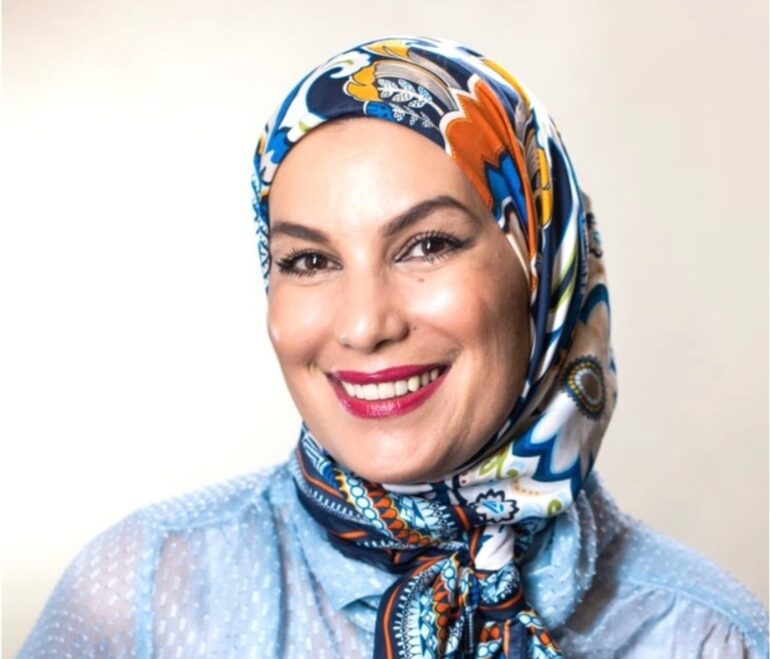

Wyoming has certainly attracted its fair share of celebrities over the years, from Harrison Ford to Sandra Bullock. However, most are concentrated in Jackson.
Not so for international biotech entrepreneur Penelope Shihab who lives and works in Laramie. She’s hosted a Ted Talk, been featured on magazine covers and is followed by 59,000 people — roughly the population of Casper — on Instagram.
Shihab is helping lead entrepreneurial efforts at the University of Wyoming, encouraging students to build new businesses in the state — a challenge she says has parallels to the Middle East. That’s where she first started work as a scientist, entrepreneur and darling among the Arab startup world.
How she got to Wyoming is a long story involving big risks, lots of schooling and camels.
Palestine and Jordan
Born in — in the West Bank of Palestine — Shihab remembers the military conflict.
“Under occupation, under wars, it’s [an] unstable, uncomfortable place for anybody with aspiration for the future,” she said.
Shihab still had a pleasant childhood with “the best family ever,” she said, but she wasn’t happy there.
At 18, she had the opportunity to go to Jordan for her continued education. She had wanted to go to England or the U.S., she said, but customs, history and heritage dictated that young women stay in the region.
“So they sent me to Jordan, which was the best opportunity in my life,” she said.
Still, she couldn’t study what she wished. Shihab had wanted to be a journalist.
“I wanted to have a platform because all of the things which we’re hearing from the media about us and about our region,” she said.
She wanted to showcase the happiness of people in the region, their values, culture and innovation. But, Shihab’s parents told her it wasn’t the right career path. Her family supported education, she said, but they wanted her to focus on medicine.
“And I never let my family down,” she once told a Tedx audience. “So I did what they wanted me to do.”
She earned a bachelor’s degree in laboratory medicine followed by graduate studies in biotechnology, hematology and immunology. While getting her degrees, she also started working with international biotech company Dako, based in Denmark. And on the home front, she had an arranged marriage and a baby soon after.
“I can say that I am a driven person and ambitious,” she said.

Shihab says her husband — now of 25 years — is great, and the job was flexible as she had three more children. She worked at Dako for nearly a decade.
Then, in her 30s, she realized that even with her “wonderful” family, four kids and rewarding job, there was more she wanted to do.
“I started to feel that I can start something very similar to that corporation in the Arab region,” she said.
Shihab earned an MBA from the London Institute in 2004 and leaned into entrepreneurship. Neighbors, friends and family had doubts, she said. She aimed to go into cancer and tumor marker research similar to her old job.
“That was [a] very crazy, crazy, crazy and risky idea,” she said, looking back.
Shihab worked for years to create a successful research and development company in Jordan, a country that had long focused on producing generic versions of pharmaceuticals created elsewhere.
She teamed up with scientists of all kinds and even had to work with the government since there were no regulations for a company like hers. Shihab started working to find investors and promote the cancer research’s possibilities, but early research efforts fell through.
“But I learned because of all of these mistakes and the falls and the failure, that I have to think in a different way, and to get different kinds of ideas, instead of copying what I was doing in my previous company,” she said.
Shihab sought help from Chris Lowe, someone she met at a conference and who ran the Institute of Biotechnology at the University of Cambridge. He accepted. With Lowe and that powerful university name behind her, the organization shifted focus and attracted more investors.
Her company MonoJo Biotech started to work with camels because they produce unique antibodies. Researchers could infect the camel in a way the animal wasn’t harmed but would create antibodies against a pathogen, she said.
Initially, the company was focused on fighting bacteria-causing ulcers in human stomachs and another bacteria that causes acne.
After creating promising products, finding business-minded mentors and attracting investors, the company ultimately decided to sell acne-fighting skin cream over the counter, Shihab said, skipping the onerous process of making it a prescription product.
“The brand hit the market and it was really successful,” she said. “Then we became [a] profitable company. Investors were happy.”
As time went on, Shihab gained international recognition for her work.

She was No. 16 among Arabian Business’s top 100 most influential Arabs in the world in 2017. (Gigi Hadid, the model and television personality, was No. 6.) In 2019, the World Economic Forum and the Bahrain Economic Development Board listed MonoJo as one of 100 Arab startups “shaping the Fourth Industrial Revolution,” and one of 10 startups helping change the Arab world.
By 2019, she earned a Ph.D. in pharmacy and biomedical sciences at the University of Strathclyde in the U.K.
Her company MonoJo — now called Jordan Company for Antibody
Production (MonoJo Biotech) — is working to merge with another company, Shihab said. It had expanded to become an international presence with the Skinue brand, including in the U.S. But Shihab is no longer with the business she built.
Coming to Wyoming
Like most people, the year 2020 turned Shihab’s world upside down.
“When COVID hit, all the markets changed, and we did not get good sales at that time,” she said.
While the company was discussing what to do, Shihab resigned. She had something bigger to address.
“My father developed cancer,” she said. “I stepped out and I left everything, and I was taking care of my father for one and a half years.”
Her siblings came back, too. But Shihab said she had a medical background, “so it was my responsibility more than others’.”
She was there with him until the end, which came in 2021.
Shihab had left her company and the world was still chaotic, she recalled. Then she learned about a potential opportunity in Wyoming — a place she’d never heard of — from UW President Ed Seidel, who she’d met in Illinois years before.
She took the leap.
Shihab initially advised the president about COVID-19 and raised awareness about the virus for the campus community. But then she started to understand the president’s vision to bolster entrepreneurship at the university, she said, and she started to help.
“This is my passion,” she said.
She now directs the University of Wyoming Center of Entrepreneurship and Innovation. Shihab was uncertain about taking the role at first, but she said Seidel reassured her that her story can show UW students how they, too, can be innovative entrepreneurs.
The center aims to “coordinate, collaborate, promote, and strengthen the entrepreneurship mindset across the state,” with early support from the governor-backed program Wyoming Innovation Partnership.
Shihab now networks between students, faculty, Wyoming business owners and state leaders, trying to identify gaps in the business ecosystem, she said.
This summer, she worked with Chris Rothfuss — who is both a professor and a state senator — to teach 18 students of various levels, majors and backgrounds how to propose business ideas to overcome challenges in the state. Then, they toured Wyoming, visiting innovative industries.
“The ultimate goal for the course was keeping our students and our workforce in the state by inspiration,” she said.
The course with Shihab was a lot of fun, Rothfuss said, adding that she’s a positive, driven person.
“Certainly the passion that she brings to the projects that she’s working on was exceptional,” he said.
Rothfuss said they have similar academic backgrounds and have both done work internationally, so they got along. Still, he acknowledges how much she’s had to work to build other connections.
“It’s hard when you come to a new institution, come to a new place as Penn did, to make those contacts so that you can get things going and get things done.” he said. “And I think Penn has done an exceptional job of that.”
“At the heart of Penn’s endeavors really is the positivity of trying to bring benefit to our students, to our community and to our state.”
Chris Rothfuss
But beyond her tireless outreach efforts, he said, she brings a lot to the table. That includes international connections for UW students, a stellar background and a sense of urgency to get things done — even when she has to contend with the slow bureaucracy of a university.
“At the heart of Penn’s endeavors really is the positivity of trying to bring benefit to our students, to our community and to our state. And as she does so very selflessly,” he said.
Looking internationally, Shihab says the business community here has similarities to Jordan.
“It’s very similar, because Wyoming is not very well known as [an] innovative place: Wyoming is known [for] energy, minerals, agriculture,” she said. “We don’t have young people staying in the state.”
But unlike Jordan, Wyomingites have far more resources, Shihab said. Students here instead need a better business ecosystem and inspiration to tackle Wyoming’s challenges themselves, she said.
Next generation
Shihab is still active in the international business community, most recently being one of only 100 people named to the prestigious Club of Rome, a global think tank focused on tackling the world’s greatest challenges.
“Penelope Shihab is an influential figure shaping the future of innovation and entrepreneurship in Wyoming and beyond with a wealth of expertise, a robust entrepreneurial spirit, and a commitment to driving economic development,” the Club stated, listing her many associations and accomplishments.

President Seidel describes Shihab as being a “world-renowned scientist and entrepreneur. We at UW are fortunate and honored for her to lead the Wyoming Center for Entrepreneurship and Innovation.”
Beyond her work, Shihab is fiercely proud of her own children, one of whom is a fashion designer and another of whom is a TV broadcast journalist — pursuing the career Shihab had desired decades before. Her younger two kids are living with her in Laramie.
“If you ask me about my biggest achievement in life, it’s my four kids,” she said. “They are amazing.”
But, Wyoming can be a challenging place for outsiders. The move to Laramie has been a somewhat difficult adjustment for the two youngest kids and herself, she said — especially the weather, food and lack of local things to do.
Shihab doesn’t know whether Wyoming will be her forever home, but given her history — researching cancer markers, starting multinational companies and nonprofits, continually pursuing education, traveling the world, driving high-performance sports cars, getting her pilot’s license and moving across the world to help Wyoming students — it’s clear whatever she does should be interesting.
The post Penelope Shihab brings the world of entrepreneurship to Wyoming appeared first on WyoFile.
This content was originally published here.





